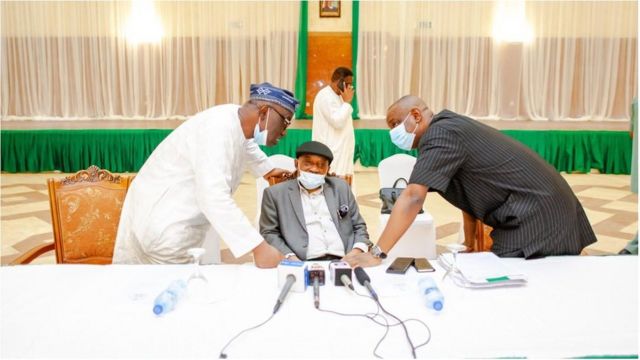The Nigerian government has extended the suspension of the new electricity tariff by one week.
James Momoh, the chairperson of the Nigeria Electricity Regulatory Commission (NERC), said this when the ad hoc Technical Committee on Electricity Tariff submitted its interim report at a reconvened meeting between the Federal Government and Organised Labour on Monday in Abuja.
The new tariff was earlier suspended for two weeks and ended at midnight on October 11. It started when the organised labour suspended the planned industrial action over agitation on the hike in electricity tariff on September 28.
The committee, chaired by Festus Keyamo, the Minister of State for Labour, is to examine the justification for the new policy.
Mr Momoh said the one-week extension is to enable the committee to review and work out modalities for the implementation of the agreement reached on the electricity tariffs structure.
Chris Ngige, the Minister of Labour and Employment, while reading a resolution reached between the Federal Government, Organised Labour and the Ad Hoc Technical Committee on Electricity Tariff, said that adoption of the work plan for effecting the resolutions has been reached.
Mr Ngige said the resolutions adopted would be implemented by all stakeholders within the week by Sunday, October 18.
According to him, the amendments to the resolutions adopted include:
“Using of the Nigerian Electricity Supply Industry (NESI) VAT proceeds to provide relief in electricity tariff. This is to leverage on the VAT from the NESI, the increases experienced by customers due to the transition to the Service Based Tariff will be reduced.
“That is Band A – 10 per cert reduction, Band B – 10.5 per cert reduction and Band C – 31 reduction,” he said.
On the acceleration of National Mass Metering Programme (NMMP), it was adopted that for the distribution of the first one million meters, the Ministry of Power was to liaise with Central Bank of Nigeria (CBN), Nigerian Electricity Regulatory Commission (NERC) and Nigerian Electricity Management Services Agency (NEMSA).
He added that they are to start work by October 12 to accelerate the roll out of meters with a target of December 2020.
The minister, therefore, said that the meeting agreed that it would work towards bridging the metering gap.
“The Federal Government committed to provide six million meters and NERC is expected to compel the DISCOs to meet the metering needs of the customers,” he said.
Mr Ngige also said on the resolution adopted for the Local procurement for Meters for National Mass Metering Programme (NMMP) that organised labour would to work with government to improve and ramp up local production capacity.
He also said that the resolution adpoted on salary protection for electricity workers was that NERC should ensure that the personnel costs of electricity workers should be placed on first-line charge on the Primary Collection Account.
He added that the process would commence from Monday, October 12.
“On the issue of mandatory refund for any over billing during system transition by the DISCOs that NERC should implement immediately within October.
‘While on the freezing of customer band migration during the interim period that the revised NERC order will include specific guidelines on freezing band migration,” he said.
Mr Ngige also noited that the resolutions adopted for Phase two for the extensive review of key sector reforms include that the ad hoc committee would work from October 12 to December 12, to ensure that all outstanding issues are resolved and implemented.
He also said the resolution adopted on gas pricing was that the Group Managing Director was co-opted into the Technical Committee to assist with the purpose.
He added that on resource capacity, the Managing Director, NEMSA, is also co-opted into the Technical Committee to work with NERC on the metering assignments.


